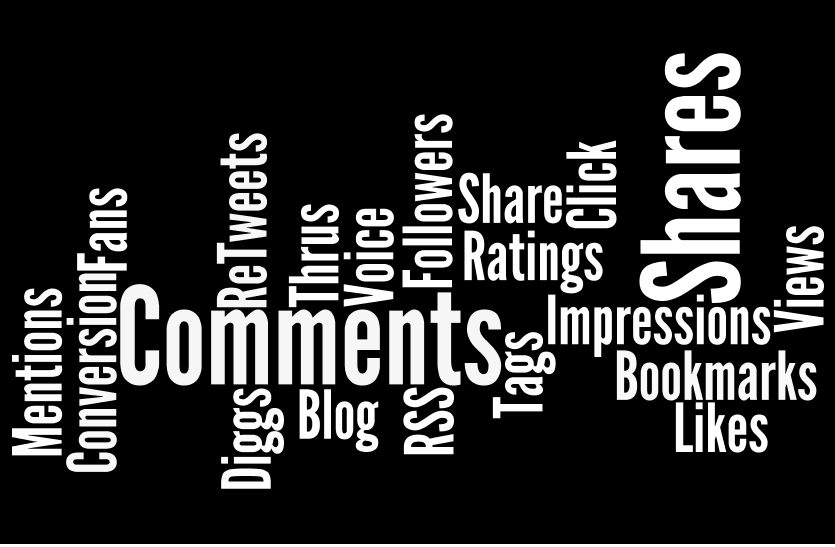Last month, I had the pleasure of speaking on social media measurement at Social Media Masters in Atlanta, the first stop in a five-city tour by Social Media Club. While I don’t consider myself to be an “industry expert” on measurement, several years of hands-on practice has resulted in a great deal of research and reflection on the subject. After all, clients hire us to provide results. So when we recommend that a client undertake a social media marketing effort as part of its PR program, then we need to be able to show them results. Is there ROI for social media? Sure there is. But – at the risk of infuriating traditionalists – you have to define what you mean by ROI first.
You see, having a gazillion Facebook fans is great. So is having a gazillion Twitter followers. Before you say “but quantity doesn’t equal quality,” let me elaborate. Focusing on Fans and Followers is exactly the right measure of success – for SOME programs. Just like media relations, community engagement, reputation management, or any other public relations function, there is no one-size-fits-all social media marketing program. And because of that, there’s also not a cookie-cutter measurement program that fits every client or brand. You have to match the reporting to the goals to be able to get to ROI, or “Return on Engagement.”
- Measurement should be defined by business/marketing objectives. Believe it or not, it’s perfectly fine for brand awareness to be your goal of social media marketing. After all, if no one knows who you are, or sees your messages, products or services, then what hope do you have of taking them through the sales funnel or convincing them to make a change in behavior? So if your marketing goal is awareness, then measure your Follower numbers, your Facebook Page impressions, your YouTube video views, your share of voice. These (and more) are your measures of success.
- What is measured may (and should be) different for everyone. Continuing on #1, but what if your goal is not simply awareness, but action? The reporting on Facebook fan increases is not going to show you if your program is working (and likely not going to make management happy). You want to look at conversion metrics, and the steps that get to conversion, such as click thrus to your website and where those “social” visitors go from there. Along the same lines, what you report to whom should also come into consideration. A CEO’s measurement dashboard will contain much different information than what you report to a PR manager.
- A combination of measurement tools often makes the most sense. There are a lot of really good paid measurement products out there. But there are also a lot of really good free ones, the top one being Google Analytics. Once you have your measurement pprograms defined by #1 and #2, there is a combination of tools available that will get to the results you need to track.
- You CAN get to an ROI for social media marketing. There is a tremendous amount of proven value in social media marketing. But just like the process of engagement on social channels, measurement of those efforts takes dedication of time and resources. There isn’t a short cut or a simple answer.

 As design director at Cookerly, Tim serves as the creative lead in the development of branding campaigns, print collateral and digital media for clients across a broad range of industries, including consumer, professional services, healthcare and technology.
As design director at Cookerly, Tim serves as the creative lead in the development of branding campaigns, print collateral and digital media for clients across a broad range of industries, including consumer, professional services, healthcare and technology. As senior vice president at Cookerly, Mike Rieman specializes in building and maintaining relationships with the media and has an excellent track record of landing significant placements in print and broadcast media including USA Today, Wall Street Journal, Bloomberg and Money Magazine.
As senior vice president at Cookerly, Mike Rieman specializes in building and maintaining relationships with the media and has an excellent track record of landing significant placements in print and broadcast media including USA Today, Wall Street Journal, Bloomberg and Money Magazine.

 As vice president of Cookerly, Sheryl Sellaway uses her extensive corporate communications background to lead consumer PR efforts, deliver strategy for marketing programs and share expertise about community initiatives.
As vice president of Cookerly, Sheryl Sellaway uses her extensive corporate communications background to lead consumer PR efforts, deliver strategy for marketing programs and share expertise about community initiatives.
 As a senior vice president at Cookerly, Matt helps organizations protect and advance their reputations and bottom lines through strategic communications programs. Using creativity, planning and flawless execution, he works with a team to deliver compelling public relations campaigns that produce results and support clients’ business objectives.
As a senior vice president at Cookerly, Matt helps organizations protect and advance their reputations and bottom lines through strategic communications programs. Using creativity, planning and flawless execution, he works with a team to deliver compelling public relations campaigns that produce results and support clients’ business objectives.
Great article on an important conversation today in social media. Here are some tips for measuring you ROI.
http://venpop.com/2011/beyond-the-numbers-measuring-social-media-success/